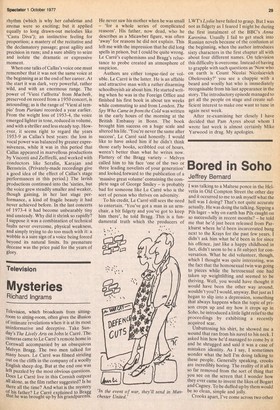Television
Mysteries
Richard Ingrams
Television, which broadcasts from sittingroom to sitting-room, often gives the illusion of intimate...revelations when it is at its most uninformative and deceptive. Take Sunday's The Lively Arts on John le Carre. The cameras came to Le Carre's remote home in Cornwall accompanied by an obsequious Melvyn Bragg. The two men talked for many hours. Le Carre was filmed striding out on the cliffs in the company of a woolly English sheep dog. But at the end one was left puzzled by the most obvious questions. Does Le Carre live in this Cornish outpost all alone, as the film rather suggested? Is he there all the time? And what is the mystery of his father? Le Carre explained to Bragg that he was brought up by his grandparents. He never saw his mother when he was small — 'for a whole series of complicated reasons'. His father, now dead, who he describes as a Micawber figure, was often 'away' for reasons he did not explain. This left me with the impression that he did long spells in prison, but I could be quite wrong. Le Carre's euphemisms and Bragg's reluctance to probe created an atmosphere of suspicion.
Authors are either tongue-tied or voluble. Le Carte is the latter. He is an affable and attractive man with a rather disarming schoolboyish air about him. He started writing when he was in the Foreign Office and finished his first book in about ten weeks while commuting to and from London. The Spy Who Came in from the Cold was written in the early hours of the morning at the British Embassy in Bonn. The book brought him success on a huge scale and altered his life. 'You're never the same after success', Le Carre said honestly. I would like to have asked him if he didn't think those early books, scribbled out of hours, weren't better than what he writes now. Flattery of the Bragg variety — Melvyn called him to his face 'one of the two or three leading novelists of your generation' and looked, forward to the publication of a 'massive great volume' containing the complete saga of George Smiley — is probably bad for someone like Le Cerro who is the sort of person who thrives on adversity.
To his credit, Le Carre still sees the need to entertain. 'You've got a man in an armchair, a bit fidgety and you've got to keep him there', he told Bragg. This is a fundamental truth which the producers of . . LWT's Lydia have failed to grasp. But I was not as fidgety as I feared I might be during the first instalment of the BBC's Anna Karenina. Usually I fail to get stuck into Russian novels because of the confusion at the beginning, when the author introduces sixty characters in the first chapter all with about four different names. On television this difficulty is overcome. Instead of having to grapple with such questions as 'Now who on earth is Count Nicolai Nicolaievich Obolovesky?' you see a chappie with a beard and woolly hat who is immediately recognisable from his last appearance in the story. The introductory episode managed to get all the people on stage and create sufficient interest to make one want to tune in again next week.
After re-examining her closely I have decided that Pam Ayres about whom I wrote last week is almost certainly Mike Yarwood in drag. My apologies.


































 Previous page
Previous page